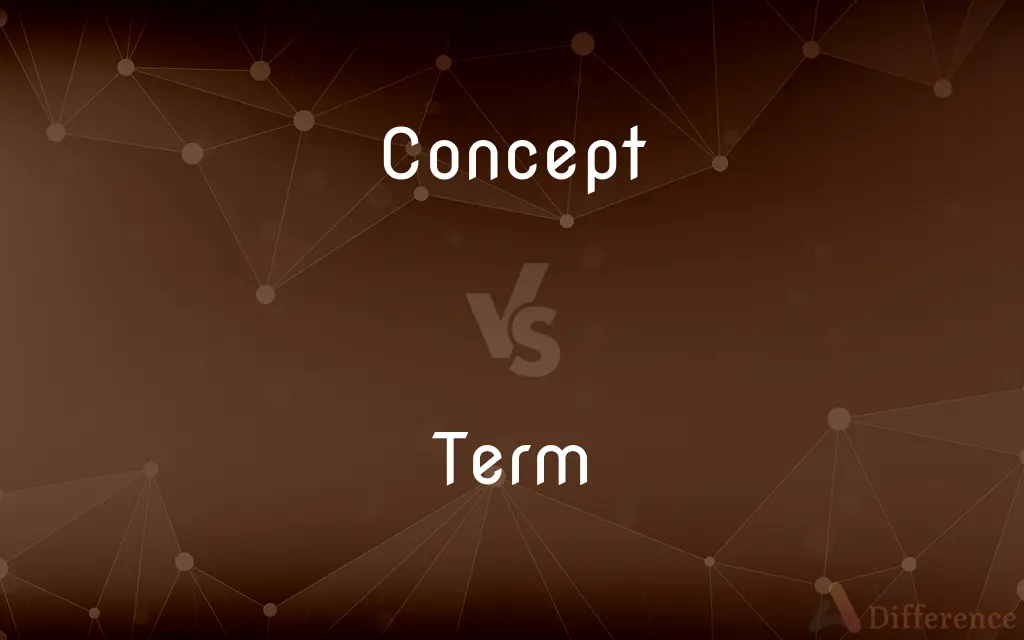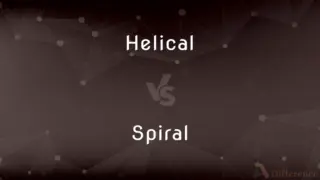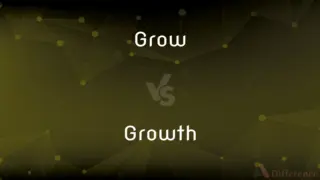Concept vs. Term — What's the Difference?
By Tayyaba Rehman & Urooj Arif — Updated on March 14, 2024
A concept is an abstract idea or a general notion that exists in the mind, while a term is a word or phrase used to describe a specific concept or object in language.

Difference Between Concept and Term
Table of Contents
ADVERTISEMENT
Key Differences
Concepts are the building blocks of thoughts and knowledge, representing ideas, phenomena, or categories of objects in a general and abstract way. They help in organizing information and experiences by categorizing and grouping similar items, phenomena, or ideas together. On the other hand, terms are specific words or expressions used to denote concepts, objects, or phenomena. They provide a linguistic handle that allows people to communicate about concepts, ideas, or objects efficiently.
Concepts are inherently abstract and can encompass a wide range of meanings and interpretations, depending on the context and the individual's understanding. They are not limited by language and can be conveyed through various means, including symbols, images, or even non-verbal expressions. In contrast, terms are specific to particular languages and cultures, and their meanings can vary significantly across different linguistic and cultural contexts.
The development and understanding of concepts often precede the identification or creation of specific terms. In the realm of science and philosophy, new concepts may emerge from research and intellectual exploration long before a specific term is coined to describe them. This process reflects the dynamic nature of knowledge and language, where concepts evolve and expand, necessitating the adaptation or creation of new terms. Conversely, the introduction of a new term can sometimes lead to the refinement or reevaluation of the concept it represents, highlighting the interplay between language and thought.
In education and learning, concepts play a crucial role in cognitive development and knowledge acquisition. They are the mental constructs that students form as they learn about the world, providing a framework for understanding new information and experiences. Teachers and educators use terms to help students grasp and articulate these concepts, facilitating communication and further exploration of ideas. This educational interplay between concepts and terms underscores their importance in the continuous process of learning and intellectual growth.
The usage and significance of concepts and terms can also vary across different disciplines. In the sciences, concepts often represent fundamental principles or phenomena, such as gravity or evolution, which are described and communicated using precise terms. In the humanities and social sciences, concepts may be more nuanced and subject to interpretation, with terms often carrying layers of meaning and connotation. This diversity reflects the broad spectrum of human knowledge and the various ways in which language and thought interact across different fields of study.
ADVERTISEMENT
Comparison Chart
Nature
Abstract idea or general notion
Word or phrase used to describe
Function
Organize and categorize information
Communicate specific concepts or objects
Dependency
Can exist without a specific term
Depends on language and culture
Flexibility
Abstract, with broad meanings
Specific, with defined meanings
Role in Language
Transcends linguistic boundaries
Bound by linguistic and cultural contexts
Compare with Definitions
Concept
An abstract idea representing a category of objects or phenomena.
The concept of freedom influences various aspects of society.
Term
A word or phrase that denotes a specific concept or object.
Biodiversity is a term used to describe the variety of life in an area.
Concept
Not limited by language, can be universal.
The concept of beauty varies across cultures but is recognized globally.
Term
Used for efficient communication and documentation.
Medical terms facilitate precise communication among healthcare professionals.
Concept
A mental construct that helps in organizing knowledge.
The concept of ecosystems is fundamental in ecology.
Term
May evolve or be coined to describe new concepts.
The term cyberspace was coined to describe interconnected digital technology.
Concept
Underlies theories, principles, and beliefs.
The concept of relativity revolutionized physics.
Term
Specific to languages and cultures.
The term hygge captures a unique concept of coziness in Danish culture.
Concept
Evolves with new information and understanding.
The concept of digital privacy has evolved with the internet.
Term
Can have multiple meanings in different contexts.
The term set has various meanings in mathematics, volleyball, and music.
Concept
Concepts are defined as abstract ideas or general notions that occur in the mind, in speech, or in thought. They are understood to be the fundamental building blocks of thoughts and beliefs.
Term
A deadline, as for making a payment.
Concept
An abstract idea
Structuralism is a difficult concept
The concept of justice
Term
A limited or established period of time that something is supposed to last, as a school or court session, tenure in public office, or a prison sentence.
Concept
A general idea or understanding of something
The concept of inertia.
The concept of free will.
Term
A point in time at which something ends; termination
An apprenticeship nearing its term.
Concept
A plan or original idea
The original concept was for a building with 12 floors.
Term
The end of a normal gestation period
Carried the fetus to term.
Concept
A unifying idea or theme, especially for a product or service
A new restaurant concept.
Term
A fixed period of time for which an estate is granted.
Concept
Having an experimental or strikingly different design, especially to test or demonstrate new features
A concept car.
Term
An estate granted for a fixed period.
Concept
An abstract and general idea; an abstraction.
Term
A word or group of words having a particular meaning, especially in a specific field
I was baffled by the technical terms that the programmers were using.
Concept
Understanding retained in the mind, from experience, reasoning and imagination; a generalization (generic, basic form), or abstraction (mental impression), of a particular set of instances or occurrences (specific, though different, recorded manifestations of the concept).
Term
Terms Language of a certain kind; chosen words
Spoke in rather vague terms.
Praised him in glowing terms.
Concept
(generic programming) A description of supported operations on a type, including their syntax and semantics.
Term
Often terms One of the elements of a proposed or concluded agreement; a condition
Offered favorable peace terms.
One of the terms of the lease.
The terms of a divorce settlement.
Concept
To conceive; to dream up
Term
Terms The relationship between two people or groups; personal footing
On good terms with her in-laws.
Concept
An abstract general conception; a notion; a universal.
The words conception, concept, notion, should be limited to the thought of what can not be represented in the imagination; as, the thought suggested by a general term.
Term
One of the quantities composing a ratio or fraction or forming a series.
Concept
An abstract or general idea inferred or derived from specific instances
Term
One of the quantities connected by addition or subtraction signs in an equation; a member.
Term
(Logic) Each of the two concepts being compared or related in a proposition.
Term
A stone or post marking a boundary, especially a squared and downward-tapering pillar adorned with a head and upper torso.
Term
An architectural or decorative motif resembling such a marker.
Term
To designate; call.
Term
That which limits the extent of anything; limit, extremity, bound, boundary, terminus#Noun.
"Alright, look...we can spend the holidays with your parents, but this time it will be on my terms."
Term
A chronological limitation or restriction, a limited timespan.
The term of a lease agreement is the period of time during which the lease is effective, and may be fixed, periodic, or of indefinite duration.
Term
Any of the binding conditions or promises in a legal contract.
Be sure to read the terms and conditions before signing.
Term
Specifically, the conditions in a legal contract that specify the price#Noun and also how and when payment#Noun must be made.
The latest models are available now, on the lowest terms you'll find anywhere, guaranteed.
Term
A point, line, or superficies that limits.
A line is the term of a superficies, and a superficies is the term of a solid.
Term
Relations among people.
We are on friendly terms with each other.
Term
Part of a year, especially one of the divisions of an academic year.
Term
Duration of officeholding, or its limit; period in office of fixed length.
He was sentenced to a term of six years in prison.
Near-term, mid-term and long-term goals
The term allowed to a debtor to discharge his debt
Term
The time during which legal courts are open.
Term
Certain days on which rent is paid.
Term
With respect to a pregnancy, the period during which birth usually happens (approximately 40 weeks from conception).
At term, preterm, postterm
Term
(of a patent) The maximum period during which the patent can be maintained into force.
Term
(archaic) A menstrual period.
Term
(mathematics) Any value (variable or constant) or expression separated from another term by a space or an appropriate character, in an overall expression or table.
All the terms of this sum cancel out.
Term
(logic) The subject or the predicate of a proposition; one of the three component parts of a syllogism, each one of which is used twice.
Term
(astrology) An essential dignity in which unequal segments of every astrological sign have internal rulerships which affect the power and integrity of each planet in a natal chart.
Term
(arts) A statue of the upper body, sometimes without the arms, ending in a pillar or pedestal.
Term
(nautical) A piece of carved work placed under each end of the taffrail.
Term
A computer program that emulates a physical terminal.
Term
One whose employment has been terminated
Term
To phrase a certain way; to name or call.
Term
(ambitransitive) To terminate one's employment
Term
Born or delivered at term.
Term neonate
Term
That which limits the extent of anything; limit; extremity; bound; boundary.
Corruption is a reciprocal to generation, and they two are as nature's two terms, or boundaries.
Term
The time for which anything lasts; any limited time; as, a term of five years; the term of life.
Term
In universities, schools, etc., a definite continuous period during which instruction is regularly given to students; as, the school year is divided into three terms.
Term
A point, line, or superficies, that limits; as, a line is the term of a superficies, and a superficies is the term of a solid.
Term
A fixed period of time; a prescribed duration
Term
The subject or the predicate of a proposition; one of the three component parts of a syllogism, each one of which is used twice.
The subject and predicate of a proposition are, after Aristotle, together called its terms or extremes.
Term
A word or expression; specifically, one that has a precisely limited meaning in certain relations and uses, or is peculiar to a science, art, profession, or the like; as, a technical term.
In painting, the greatest beauties can not always be expressed for want of terms.
Term
A member of a compound quantity; as, a or b in a + b; ab or cd in ab - cd.
Term
The menses.
Term
Propositions or promises, as in contracts, which, when assented to or accepted by another, settle the contract and bind the parties; conditions.
Term
In Scotland, the time fixed for the payment of rents.
Term
A piece of carved work placed under each end of the taffrail.
I can not speak in term.
Term
To apply a term to; to name; to call; to denominate.
Men term what is beyond the limits of the universe "imaginary space."
Term
A word or expression used for some particular thing;
He learned many medical terms
Term
A limited period of time;
A prison term
He left school before the end of term
Term
(usually plural) a statement of what is required as part of an agreement;
The contract set out the conditions of the lease
The terms of the treaty were generous
Term
Any distinct quantity contained in a polynomial;
The general term of an algebraic equation of the n-th degree
Term
One of the substantive phrases in a logical proposition;
The major term of a syllogism must occur twice
Term
The end of gestation or point at which birth is imminent;
A healthy baby born at full term
Term
(architecture) a statue or a human bust or an animal carved out of the top of a square pillar; originally used as a boundary marker in ancient Rome
Term
Name formally or designate with a term
Common Curiosities
Can a concept exist without a term?
Yes, concepts can exist independently of specific terms, as they are abstract ideas that do not rely on language.
How do new terms come into existence?
New terms are often coined or adapted to describe new concepts, discoveries, or phenomena that emerge in culture, science, and technology.
How do terms help in understanding concepts?
Terms provide linguistic handles that allow for the efficient communication and exploration of concepts.
How does the understanding of a concept influence its corresponding term?
The understanding of a concept can influence the nuances, usage, and evolution of its corresponding term, especially as the concept evolves or expands.
How do cultural differences impact the understanding of concepts and terms?
Cultural differences can significantly impact the interpretation and significance of concepts and terms, leading to variations in meaning and usage across cultures.
Are all terms derived from existing concepts?
Most terms are derived from existing concepts, but some terms, especially in technical or specialized fields, may be created before a fully formed concept exists.
What is the difference between a concept and a term?
A concept is an abstract idea or general notion, while a term is a specific word or phrase used to describe a concept or object.
Are concepts universal across languages?
While concepts can be universal, the terms used to describe them vary across languages and cultures.
Can a single term represent multiple concepts?
Yes, a single term can have multiple meanings or represent different concepts in various contexts, known as polysemy.
How does the translation of terms affect the conveyance of concepts?
Translation can affect the conveyance of concepts, as some terms may not have direct equivalents in other languages, potentially leading to misunderstandings or loss of nuance.
Can the same concept have different terms in different disciplines?
Yes, the same concept may be referred to by different terms in different disciplines, reflecting the specialized language and perspectives of each field.
How do new technologies influence the development of concepts and terms?
New technologies often lead to the development of new concepts and the coining of new terms to describe these innovations and their impacts on society.
How do metaphors contribute to the formation of concepts and terms?
Metaphors can play a significant role in the formation of concepts and terms by providing intuitive ways to understand and communicate complex or abstract ideas through more familiar terms.
Why is it important to agree on the definitions of terms in a professional setting?
Agreeing on the definitions of terms in a professional setting is crucial for ensuring clear communication, avoiding misunderstandings, and facilitating collaboration.
What role do terms play in academic and professional disciplines?
In academic and professional disciplines, terms serve as crucial tools for precise communication, enabling the clear expression and discussion of complex concepts and ideas.
Share Your Discovery

Previous Comparison
Helical vs. Spiral
Next Comparison
Grow vs. GrowthAuthor Spotlight
Written by
Tayyaba RehmanTayyaba Rehman is a distinguished writer, currently serving as a primary contributor to askdifference.com. As a researcher in semantics and etymology, Tayyaba's passion for the complexity of languages and their distinctions has found a perfect home on the platform. Tayyaba delves into the intricacies of language, distinguishing between commonly confused words and phrases, thereby providing clarity for readers worldwide.
Co-written by
Urooj ArifUrooj is a skilled content writer at Ask Difference, known for her exceptional ability to simplify complex topics into engaging and informative content. With a passion for research and a flair for clear, concise writing, she consistently delivers articles that resonate with our diverse audience.
















































